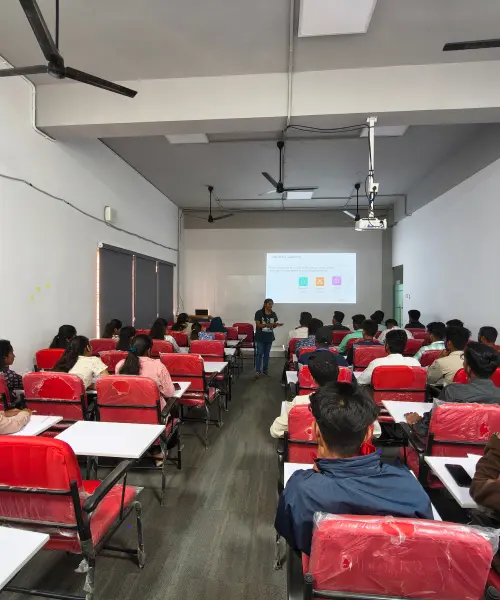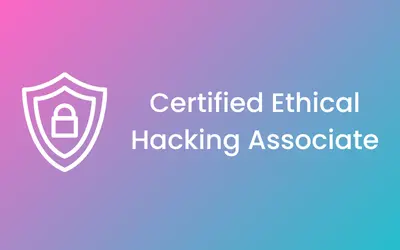- Practical Curriculum: The ethical hacking curriculum focuses on real-world hacking techniques, penetration testing methods, vulnerability assessment, and security testing practices that align with current industry requirements and job roles.
-
Expert Mentors: Training is guided by experienced ethical hacking professionals who bring practical industry exposure, helping students understand real attack scenarios, defensive strategies, and professional security testing workflows.
-
Hands-On Labs: Students actively practice ethical hacking through live labs, simulated attack environments, and guided exercises that build confidence in using tools, exploiting vulnerabilities, and securing systems ethically.
-
Industry Certification: The course offers an industry-recognized ethical hacking certification that validates technical skills, improves credibility, and enhances employability for entry-level and intermediate ethical hacking roles.
-
Flexible Learning: Flexible batch timings, including weekday and weekend options, allow students and working professionals to learn ethical hacking without compromising academic, professional, or personal commitments.
-
Placement Assistance: Dedicated placement support helps students prepare resumes, practice interviews, and connect with recruiters seeking ethical hackers, penetration testers, and security analysts across Hyderabad’s tech ecosystem.
-
Advanced Tools: Learners gain hands-on experience with widely used ethical hacking tools like Nmap, Metasploit, Burp Suite, and Wireshark, preparing them for real penetration testing assignments.
-
Real-World Focus: Case studies, attack simulations, and practical assessments help students understand how ethical hacking is applied to secure websites, networks, applications, and enterprise systems.
-
Career Exposure: The training introduces multiple career paths, such as ethical hacker, penetration tester, SOC analyst, and security consultant, helping students make informed career decisions.
-
Skillfloor Advantage: Along with ethical hacking, Skillfloor also offers AI, Data Science, and Digital Marketing courses in Hyderabad, allowing learners to expand skills and explore interdisciplinary career opportunities.
Why Hyderabad Is a Growing Hub for Ethical Hacking Careers
Hyderabad has rapidly evolved into one of India’s most important technology-driven cities, creating strong demand for ethical hacking professionals. With established IT zones such as HITEC City, Gachibowli, and the Financial District, the city is home to global IT services firms, product-based companies, fintech platforms, healthcare tech providers, and government-backed digital initiatives. These organizations rely heavily on secure networks, web applications, and cloud infrastructure, which increases the need for ethical hackers to identify security gaps before malicious attackers can exploit them.
The rise of digital transformation in Hyderabad has further strengthened the scope for ethical hacking careers. Companies are actively deploying cloud services, mobile applications, IoT systems, and AI-driven platforms, all of which require continuous security testing. Ethical hackers are increasingly involved in penetration testing, vulnerability assessments, red teaming, and compliance-driven security audits. With growing awareness of data breaches, ransomware attacks, and regulatory requirements, businesses now consider ethical hacking a core function rather than an optional service.
Hyderabad also offers a favorable environment for students and early-career professionals looking to enter ethical hacking. The city provides access to quality training institutes, hands-on labs, internships, and exposure to real-world security projects. Compared to other metro cities, Hyderabad combines strong job availability with a relatively affordable cost of living, making it attractive for long-term career growth. With steady hiring, expanding security teams, and increasing investment in cybersecurity, Hyderabad continues to emerge as a reliable and future-ready hub for ethical hacking careers.
Scope of Ethical Hacking Jobs in Hyderabad
Hyderabad has emerged as a major destination for cybersecurity and ethical hacking careers, driven by rapid digital transformation across industries. As organizations increasingly rely on web applications, cloud platforms, and digital infrastructure, the need to identify and prevent security threats has become a top priority. This has significantly expanded opportunities for ethical hacking professionals in the city.
-
High Demand Across IT Sectors - IT services, software development firms, fintech companies, and healthcare platforms in Hyderabad actively hire ethical hackers to secure systems, applications, and sensitive data.
-
Rising Need for Penetration Testing - Companies conduct regular penetration testing to uncover vulnerabilities, creating a steady demand for ethical hackers skilled in testing methodologies and security reporting.
-
Growth in Cloud and Application Security - With increased use of cloud services and web applications, ethical hackers are needed to test APIs, cloud environments, and enterprise-level applications.
-
Compliance and Security Assessment Roles - Many organizations require ethical hackers to support vulnerability assessments and security audits to meet regulatory and data protection requirements.
-
Entry-Level to Advanced Career Progression - Freshers can begin as junior ethical hackers or security analysts, while experienced professionals can advance to penetration testers, red team experts, or security consultants.
-
Opportunities in Startups and MNCs - Hyderabad’s strong startup ecosystem and presence of multinational companies provide diverse job opportunities across multiple domains.
-
Freelancing and Consulting Potential - Ethical hackers can also work independently, offering security testing and consulting services to businesses that outsource cybersecurity tasks.
-
Long-Term Career Stability - As cyber threats continue to grow in complexity, ethical hacking remains a critical role, offering long-term career security and consistent professional growth.
Overall, the scope of ethical hacking jobs in Hyderabad continues to expand as organizations prioritize proactive security measures. With the right skills, hands-on experience, and industry-recognized training, professionals can build rewarding and sustainable careers in this fast-growing field.
Ethical Hacker Salary & Career Growth in India
Ethical hacking is one of the fastest-growing career paths in India due to the rising demand for cybersecurity professionals. Companies across IT, fintech, healthcare, and e-commerce sectors actively hire ethical hackers to protect their networks, applications, and sensitive data. The field offers both lucrative salaries and long-term career growth opportunities.
-
Entry-Level Salary - Freshers in ethical hacking roles can earn between ₹3.5–5 LPA, depending on skills, certifications, and organization size.
-
Mid-Level Salary - Professionals with 2–5 years of experience can earn ₹6–10 LPA, especially if skilled in penetration testing, network security, or cloud security.
-
Senior-Level Salary - Experienced ethical hackers, security analysts, or penetration testers with 5+ years of experience can earn ₹12–25 LPA, particularly in MNCs or security-focused firms.
-
Freelancing & Bug Bounty Opportunities - Skilled ethical hackers can also earn additional income through freelance projects, vulnerability assessments, and bug bounty programs, sometimes surpassing regular salaries.
-
Career Growth - Ethical hackers can progress to roles like Security Consultant, Red Team Specialist, Cybersecurity Architect, or SOC Manager, with increasing responsibility and remuneration.
-
Industry Demand - With cybercrime in India growing over 15% annually and the global cybersecurity market expected to reach $350 billion by 2026, the demand for ethical hackers continues to rise, ensuring long-term career stability.
Ethical hacking provides not just financial rewards but also the opportunity to work on cutting-edge technologies, solve complex security challenges, and contribute to safeguarding organizations in an increasingly digital world.
Why Students Choose Skillfloor for Ethical Hacking Training
Students choose Skillfloor for ethical hacking training because the institute combines comprehensive theoretical knowledge with practical, hands-on learning. The curriculum is carefully designed to cover all critical areas of ethical hacking, including penetration testing, network security, web application security, system exploitation, and vulnerability assessment. This ensures that learners not only understand the concepts but also gain the ability to apply them in real-world scenarios, preparing them for the demands of modern cybersecurity roles.
Skillfloor emphasizes experiential learning through live labs, simulated attack environments, and guided projects. Students get to work on real-time ethical hacking exercises, using industry-standard tools such as Nmap, Metasploit, and Burp Suite. This approach helps them build technical confidence, develop problem-solving skills, and understand how ethical hackers detect vulnerabilities and secure systems effectively. By completing the program, learners are prepared to become Certified Ethical Hacking Professionals, ensuring they are job-ready and fully equipped to handle professional cybersecurity roles.
Beyond technical training, students are drawn to Skillfloor because of the mentorship, career guidance, and placement support provided. From resume preparation and interview coaching to connecting with potential employers, the institute helps learners transition smoothly into professional roles such as Ethical Hacker, Penetration Tester, Security Analyst, or Vulnerability Assessment Specialist. With a supportive learning environment, expert trainers, and a focus on real-world application, Skillfloor remains a top choice for students aspiring to build a successful career in ethical hacking.
Ethical Hacking Course Fees at Skillfloor: What’s Included
Skillfloor’s Ethical Hacking Course fee in Hyderabad is Rs. 14,900 offers comprehensive value that covers not just lessons but practical exposure, tools, mentorship, and career support. Below are the key components included in the fee:
-
Structured Ethical Hacking Curriculum - Covers network penetration testing, vulnerability assessment, system exploitation, web application security, reconnaissance, and reporting techniques aligned with industry needs.
-
Live Practical Labs & Projects - Hands‑on practice through real‑world attack simulations, lab exercises, and structured projects that reinforce learning and build applied technical skills.
-
Industry‑Standard Tools Access - Training includes exposure to commonly used ethical hacking tools such as Nmap, Metasploit, Burp Suite, Wireshark, and other scanning and security testing utilities.
-
Expert Trainer Guidance - Sessions are conducted by industry‑experienced ethical hacking professionals who provide insights, best practices, and real‑scenario problem solving.
-
Mentorship & Doubt Support - Continuous mentor support, doubt‑clearing sessions, and personalized guidance throughout the training to help students grasp concepts effectively.
-
Certification Preparation - Guidance and training are aligned to help learners prepare for recognized ethical hacking certifications that validate their professional skills.
-
Resume & Interview Support - Assistance with creating a strong ethical hacking–focused resume and prep for technical interviews to improve job readiness.
-
Placement & Career Assistance - Support in job search strategies, company connections, and internship opportunities to help students transition into ethical hacking roles.
The ₹14,900 fee is designed to be affordable while providing full value, ensuring learners gain practical skills, industry exposure, and career support, all essential for entering ethical hacking roles such as Ethical Hacker, Penetration Tester, and Security Analyst.
Ethical Hacking Placement Support at Skillfloor
Skillfloor offers comprehensive placement support to students enrolled in ethical hacking training, helping them transition seamlessly from learning to professional roles. The institute emphasizes building practical skills through hands-on labs, real-world projects, and live attack simulations. This ensures that learners are not just theoretically prepared but also equipped to handle actual cybersecurity challenges faced by organizations. By combining technical expertise with practical exposure, Skillfloor prepares students to enter the ethical hacking job market confidently.
In addition to technical training, Skillfloor provides personalized career guidance to students. This includes resume building tailored for ethical hacking roles, preparation for technical interviews, mock assessments, and one-on-one mentorship sessions. Students are trained to showcase their skills effectively, understand industry expectations, and present themselves confidently to recruiters. This focused support helps learners gain an edge during recruitment for roles such as Ethical Hacker, Security Analyst, or Penetration Tester. Skillfloor also maintains strong collaborations with IT companies, startups, and cybersecurity firms in Hyderabad and other major cities. These partnerships give students access to internships, live projects, and placement opportunities in reputable organizations. Whether it’s an entry-level security analyst position or a specialized ethical hacking role, the placement support ensures that learners have the necessary resources, connections, and guidance to launch and grow a successful career in cybersecurity.
Turn Ethical Hacking Skills into a Successful Career
Skillfloor goes beyond just teaching ethical hacking; it ensures students are fully prepared to enter the competitive cybersecurity industry. Through hands-on labs, real-world projects, and live simulations, learners develop practical skills that make them job-ready. The institute’s structured training focuses on essential areas like penetration testing, network security, web application security, and vulnerability assessment, giving students the confidence to tackle real-world challenges effectively. In addition to technical training, Skillfloor provides personalized mentorship and career guidance. Students receive support in creating strong resumes, preparing for technical interviews, and mastering assessments specific to ethical hacking roles. Mock interviews, doubt-clearing sessions, and one-on-one mentorship help learners refine their skills and present themselves confidently to potential employers. This tailored guidance significantly improves placement opportunities for both freshers and professionals.
Furthermore, Skillfloor’s strong industry connections with IT firms, startups, and cybersecurity companies provide students access to internships, live projects, and recruitment opportunities. Whether aiming for a role as an Ethical Hacker, Security Analyst, Penetration Tester, or Red Team Specialist, learners receive the guidance, exposure, and support needed to succeed. With Skillfloor, students can confidently launch and grow their careers in ethical hacking, making it a smart choice for anyone aspiring to thrive in the rapidly evolving field of cybersecurity.


























